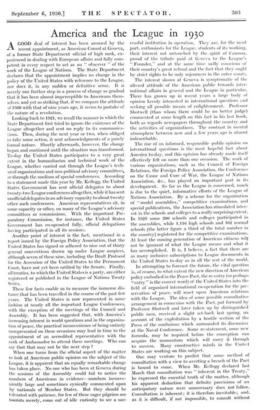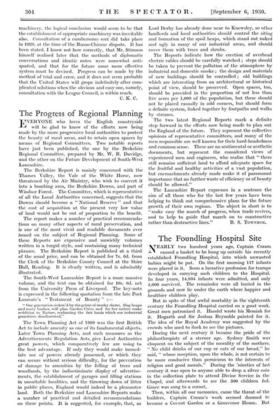America and the League in 1930
A GOOD deal of interest has been aroused by the CM- recent appointment, as American Consul at Geneva, of a former State Department official of high rank, ex- perienced in dealing with European affairs and fully com- petent in every respect to act as an " observer " of the work of the League of Nations. The State Department declares that the appointment implies no change in the policy of the United States with reference to the League, nor does it, in any sudden or definitive sense. It is merely one further step in a process of change so gradual that it has been almost imperceptible to Americans them- selves, and yet so striking that, if we compare the attitude of 1930 with that of nine years ago, it seems to partake of the nature of a revolution.
Looking back to 1921, we recall the manner in which the State Department first tried to ignore the existence of the League altogether and sent no reply to its communica- tions. Then, during the next year or two, when obliged to take some action, it sent acknowledgments of a purely formal nature. Shortly afterwards, however, the change began and continued until the situation was transformed. To-day the United States participates to a very great extent in the humanitarian and technical work of the League, whether carried out through the League's tech- nical organizations and non-political advisory committees, or through the medium of special conferences. According to a statement made this year by Mr. Kellogg, the United States Government has sent official delegates to about twenty-two League conferences altogether, while it has sent unofficial delegates in an advisory capacity to about twenty other such conferences. American representatives sit, in some capacity or other, on many of the League's advisory committees or commissions. With the important Pre- paratory. Commission, for . instance, the United States Government has co-operated fully, official delegations having participated in all its sessions.
Another point of interest is the fact, mentioned in a report issued by the Foreign Policy Association, that the United States has signed or adhered to nine out of thirty general conventions drawn up under League auspices, although seven of these nine, including the Draft Protocol for the Accession of the United States to the Permanent Court, have not yet been ratified by the Senate. Finally, all treaties, to which the United States is a party, are either registered or published in the League of Nations Treaty Series. •
These few facts enable us to measure the immense dis- tance that has been travelled in the course of the past few years. The United States is now represented in some fashion at nearly all the important League Conferences, with the exception of the meetings of the Council and Assembly. It has been suggested that, with America's increasing interest in world questions and in the organiza- tion of peace, the practical inconvenience of being entirely unrepresented on these occasions may lead in time to the appointment of an accredited representative with the rank of Ambassador to attend these meetings. Who can say that that may not be the next step ?
When one turns from the official aspect of the matter to look at American public opinion on the subject of the League, it is apparent that an equally remarkable change has taken place. No one who has been at Geneva during the sessions of the Assembly could fail to notice the numbers of Americans in evidence—numbers inconve- niently large and sometimes cynically commented upon by nationals of Member States. But they should be tolerated with patience, for few of these eager pilgrims are tourists': merely, come out of idle curiosity to see a suc- cessful institution in operation. They are, for the most part, enthusiasts for the League, students of its working, their interest not untouched by the spirit of Canossa, proud of the tribute paid at Gcneva to the League's "Founder," and at the same time sadly conscious of their country's great refusal and the fact that they ought by strict rights to be only sojourners in Else outer courts.
The interest shown at Geneva is symptomatic of the altered attitude of the American public towards inter- national affairs in general and the League in particular. There has grown up in recent years a large body of opinion keenly interested in international questions raid seeking all possible means of enlightenment. Professor Shotwell (than whom there could be no better judge) commented at some length on this fact in his last book, both as regards newspapers throughout the country and the activities of organizations. The contrast in mental atmosphere between now and a few years ago is almost indescribable.
The rise of an informed, responsible public opinion on international questions is the most hopeful fact about America to-day, and this opinion has already made itself effectively felt on more than one occasion. The work of various organizations, such as tlse Council of Foreign Relations, the Foreign Policy Association, the Conference on the Cause and Cure of War, the League of Nations Association, &c., has played an important part in its development. So far as the League is concerned, much is due to the quiet, informative efforts of the League of Nations Association. By a scheme for the organization of "model assemblies," competitive examinations, and special publications, the Association has stimulated inter- est in the schools and colleges to a really surprising extent. In 1929 some 200 schools and colleges participated in the assemblies, while 1,116 high schools and 102 normal schools (the latter figure a third of the total number in the country) registered for the competitive examinations. At least the coming generation of American citizens will not be ignorant of what the League means and what it has accomplished. It is, I believe, a fact that there are as many inclusive subscriptions to League documents in the United States to-day as in all the rest of the world.
In attempting to forecast the future, the vital question is, of course, to what extent the new direction of American policy embodied in the Peace Pact, the re-entry (or perhaps " entry " is the correct word) of the United States into the field of organized international co-operation for the pre- servation of peace, will react upon American relations with the League. The idea of some possible consultative arrangement in connexion with the Pact, put forward by Professor Shotwell and later taken up by distinguished public men, received a slight set-back last spring, on account of the exploitation by a hostile section of the Press of the confusions which surrounded its discussion at the Naval Conference. Some re-statement, some new formula, may be required before the conception can acquire the momentum Which will carry it through to success. Many constructive minds in the Unitel States are working on this subject. .
One may venture to predict that some method of consultation with a view to averting a breach of the Pact is bound to come. When Mr. Kellogg declared last March that consultation was "inherent in the Treaty," he expressed the essential truth of the matter, although his apparent deduction that definite provisions of an anticipatory nature were unnecessary does not follow. Consultation is inherent ; it is therefore inevitable; and, as it is difficult, if not impossible, to consult without
machinery, the logical conclusion would seem to be that the establishment of appropriate machinery was inevitable also. Consultation of a cumbersome sort did take place in 1929, at the time of the Russo-Chinese dispute. It has been stated, I know not how correctly, that Mr. Stimson himself realised later that the methods of diplomatic conversations and identic notes were somewhat anti- quated, and that for the future some more effective system must be devised. Progress can be made by the method of trial and error, and it does not seem probable that the United States will grope indefinitely after com- plicated solutions when the obvious and easy one, namely, consultation with the League Council, is within reach.
C. K. C.































 Previous page
Previous page